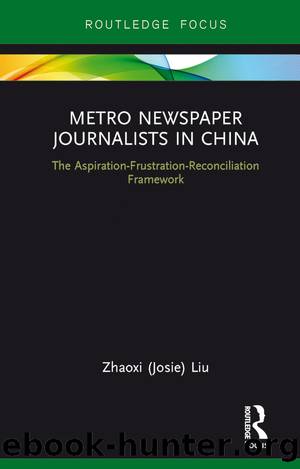Metro Newspaper Journalists in China by Zhaoxi (Josie) Liu

Author:Zhaoxi (Josie) Liu [Liu, Zhaoxi]
Language: eng
Format: epub
Tags: Social Science, Media Studies, Language Arts & Disciplines, Journalism, Regional Studies
ISBN: 9781317199755
Google: cjklDwAAQBAJ
Publisher: Taylor & Francis
Published: 2016-08-25T06:03:22+00:00
Global Influence
The term âoverseasâ (guo wai), which in regular Chinese parlance refers to developed, democratic Western countries and occasionally advanced industrial countries in Asia such as Japan and Korea, came up frequently in journalistsâ conversations and in my interviews. It was such a prominent pattern in my conversation with the journalists as well as amongst themselves that it almost seemed like no conversation was complete until such comparisons were made. A journalist was groaning in front of his computer one day when he saw stories authored by his colleagues were posted on Yunnan Net, the portal of the provincial Party organ Yunnan Daily, without crediting his own paper as the origin. âBestseller writers in the U.S. can buy a big house in New York City. Not gonna happen in China. China doesnât protect the cultural industry, writers or intellectual propertyâ was his conclusion (October 11, II). Another day, during a lunch break in the newsroom, the journalists had an impromptu conversation about Steve Jobs, who died just a few days before. The conversation soon changed from admiring Jobs to inquiring why China did not have its own Steve Jobs, whereby the journalists condemned Chinaâs rigid educational methods, the convention of looking down upon people without a college degree, and the culture of suppressing and punishing kids who think and act differently from others (October 8, II). In other words, the conversation turned into a comparison between China and the U.S., with the conclusion that China lags behind the U.S. in terms of innovation and creativity.
In indeed, in such comparisons, China usually is deemed inferior to other countries, especially the U.S., from small things such as drinkable tap water to big issues like press freedom, political systems, and the conduct of government officials. In July 2011, for example, Chinese media paid fervent attention to the new U.S. Ambassador to China Gary Locke when he first arrived in China, noting admiringly that he flew coach and ate simply. A chief editor explained this as a reflection of Chinese peopleâs dislike of government officials and general antipathy toward those with means. âIn China, government officials are the privileged stratus, which leads to hatred toward the powerful and the rich,â he said. âAmericans do not hate the rich. They respect people who build something from nothing. Many rich people in China made their wealth through illegal approaches and collusion with the authorities. Therefore in China, wealth is a sensitive topicâ (October 18, II).
Kunming journalists frequently mention The New York Times, and even the Huffington Post, as representing higher standards of journalism than Chinaâs media provide, all the while admiring Western mediaâs freedom, something Chinese media lack. âMedia in China are totally controlled by a political party. Foreign media, although more or less influenced by political parties, feel like independent institutions,â one executive commented (September 21). Another journalist asserted that the U.S. muckrakers of the olden days faced far less dire conditions than do Chinaâs investigative journalists today.
These metro paper journalists admitted having borrowed a lot of American journalism ideas to form their own journalistic values.
Download
This site does not store any files on its server. We only index and link to content provided by other sites. Please contact the content providers to delete copyright contents if any and email us, we'll remove relevant links or contents immediately.
Index to the London Magazine by Frank P. Riga Claude A. Prance(205)
Female Impersonation by Carol-Anne Tyler(158)
Creativity and Feature Writing by Ellie Levenson(143)
A Filtered Life by Nicole Taylor Mimi Nichter(141)
Xenolinguistics; Towards a Science of Extraterrestrial Language by Douglas A. Vakoch & Jeffrey Punske(136)
Theories of Journalism in a Digital Age by Steen Steensen Laura Ahva(135)
Developing Translanguaging Repertoires in Critical Teacher Education by Zhongfeng Tian Nicole King(134)
Critical Communication Pedagogy by Fassett Deanna L.;Warren John T.; & John T. warren(130)
Torture, Intelligence and Sousveillance in the War on Terror by Vian Bakir(129)
Computing the News: Data Journalism and the Search for Objectivity by Sylvain Parasie(127)
Origin Of Ethnography In Japan by Minoru Kawada(124)
Transformative Media Pedagogies by Paul Mihailidis Sangita Shresthova Megan Fromm(119)
Peace Journalism in East Africa by Fredrick Ogenga(118)
A Networked Self and Platforms, Stories, Connections by Zizi Papacharissi(115)
Matter Transmission by Nicolás Salazar Sutil(114)
Revisiting Transnational Broadcasting by Nelson Ribeiro Stephanie Seul(113)
Media Studies 2.0 by William Merrin(113)
Media Audiences by Sue Turnbull(109)
The Gentrification of the Internet by Jessa Lingel(107)
